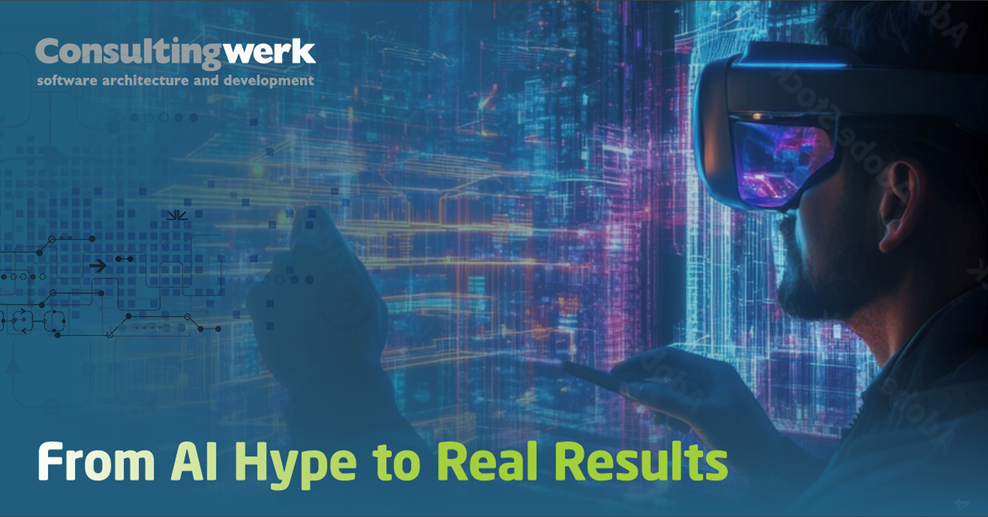by
Kristina Rümmler
| Oct 29, 2025

AI is transforming how we build, test, and maintain software – but most development teams are still only scratching the surface – if at all. For many, “AI-assisted development” begins and ends with better autocomplete suggestions in the IDE. That’s helpful – but far from transformative.
What separates high-impact teams is how deeply and intentionally they integrate AI into their development and testing workflows, especially when dealing with complex, business-critical applications built using Progress OpenEdge.
At Consultingwerk, we’ve seen first-hand what works – and what doesn’t – when enabling AI in real-world enterprise environments. Here’s what we’ve learned:
AI Enablement Isn’t Just About Tools — It’s About Empowering People
Developers want more than “smarter autocompletion”; they expect structured, repeatable, and prompt-based workflows that let them express their objectives and get back high-quality, maintainable code.
Product owners need AI tools that analyze, categorize, and document existing business logic, domain rules, and workflows – helping them capture the essence of the application and make it understandable and reusable across teams.
Teams need confidence that AI won’t introduce new tech debt. The goal is to reduce debt, not hide it behind generated artifacts.
This requires serious investment in QA and validation tooling – ensuring AI produces better, not just faster, code. After all, humans are already capable of producing low-quality code quickly.
Thus, our focus at Consultingwerk is not just on deploying “AI tools”, but on building capability: teaching teams how to use those tools intentionally, safely, and effectively.
What Works in Real-World OpenEdge Development
Progress OpenEdge is a powerful ecosystem and database with its own language – ABL (Advanced Business Language) – and deep integration into core business processes. It's also a challenge for generic AI solutions.
Here’s where we’ve seen the greatest success using AI in OpenEdge contexts:
- Prompt-Based ABL Development
Instead of relying on AI for basic autocomplete, we work with teams to adopt prompt-driven development workflows. These allow developers and software architects to express intent and use AI to generate structured, maintainable ABL code that aligns with their domain logic. Ideally, a single person can instruct multiple AI agents to write applications in parallel streams.
- AI-Powered Refactoring of Legacy Code
Many OpenEdge systems have evolved over decades. We use AI to analyze and refactor ABL codebases, surface patterns, reduce duplication, and improve maintainability – all while preserving mission-critical functionality.
- Combining OpenEdge and AI via MCP Servers
Through integration with MCP (Multi-Channel Process) servers, we connect OpenEdge logic to AI-powered agents and framework metadata. These agents can interact with business data, trigger workflows, or provide intelligent support – blending the reasoning of LLMs with the reliability of existing OpenEdge applications.
- Integrating Chatbots into OpenEdge Applications
AI-powered chatbots can provide a conversational interface to core business processes. By integrating them into OpenEdge applications, teams can deliver intuitive, user-friendly access to enterprise data and workflows – extending the reach and value of their systems.
What Customers Gain From AI Enablement
Customers who work with us aren’t just using AI – they’re benefiting from it in measurable ways:
Faster development cycles using structured, prompt-based coding
More maintainable systems through AI-assisted refactoring
New capabilities by extending OpenEdge with intelligent agents
Long-term skills and strategy, not just short-term tools
We’ve moved beyond experimentation — these practices are already delivering value in real ABL-heavy systems, with secure, repeatable workflows in daily use.
Takeaway: AI Isn’t the Goal. Enablement Is.
If you’re serious about AI in software development, ask yourself:
Are your teams equipped to collaborate with AI agents and get beyond consumption of smarter suggestions?
Are your workflows ready for prompt-based development and refactoring?
Are you using AI to simplify and modernize – or just add complexity?
We believe the future of software development is not AI vs. developers, but AI with developers – and the teams who learn how to harness that collaboration will ship better software, faster.